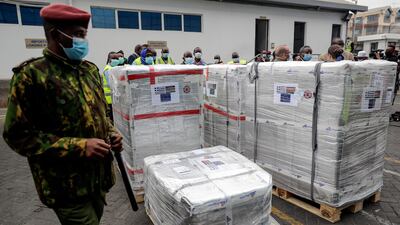Eight in 10 African countries are on course to miss a key target of vaccinating their most vulnerable people by the end of this month, the World Health Organisation has warned.
The UN health agency blames this partly on the “deeply disturbing” lack of Covid-19 vaccine supplies compared to the rich world.
But although deliveries are speeding up from Covax – a WHO-led initiative to provide vaccines to poor countries – and the African Union, some countries are moving too slowly to distribute supplies, the WHO said.
WHO chief Tedros Adhanom Ghebreyesus wants the most vulnerable 10 per cent of every country’s population vaccinated this month, in what he has described as a “sprint to September”.
Nine African countries have already met the target, including Morocco, Tunisia and South Africa. Three others are on course to do so by the end of the month.
This leaves 42 out of 54 countries unlikely to reach the target, although two could yet do so, if they speed up the distribution of vaccines, the WHO said.
“Vaccine hoarding has held Africa back and we urgently need more vaccines,” said Dr Matshidiso Moeti, the WHO’s regional director for Africa.
“But as more doses arrive, African countries must zero in and drive forward precise plans to rapidly vaccinate the millions of people who still face a grave threat from Covid-19.”
Wealthy countries were widely condemned for hoarding early vaccine supplies as they raced to immunise their own populations. The WHO has criticised rich nations for using spare doses as boosters instead of donating them.
Only three per cent of Africa’s population is fully vaccinated, compared to more than half of people in the UK, US and EU.
There was further criticism when it emerged that people vaccinated with an Indian-made version of the AstraZeneca vaccine, widely used by Covax, might not be allowed to travel to Europe.
But the tide is starting to turn as Covax deliveries accelerate. Africa received more doses in August than in the previous four months combined.
Further doses are being shipped via the AU, which has received donations from the US government. France announced this week that it would send 10 million AstraZeneca and Pfizer doses to Africa.
It means attention is turning to the domestic pace of vaccinations in Africa, which the WHO described as too slow in many countries.
There are 26 African countries which have distributed less than half of their vaccine stock, the WHO said.
The UN agency faulted some nations for failing to update their vaccination plans or reviewing their progress to find improvements.
“Recent rises in vaccine shipments and commitments shows that a fairer, more just global distribution of vaccines looks possible,” said Dr Moeti.
“The pandemic is still raging in Africa and we must not let our guard down.”
A third wave of virus cases in Africa peaked in July, but numbers are still high. The Delta variant dominant in Europe has been found in 31 African countries.
The Beta variant was first identified in South Africa and has surfaced in 38 other countries on the continent.


